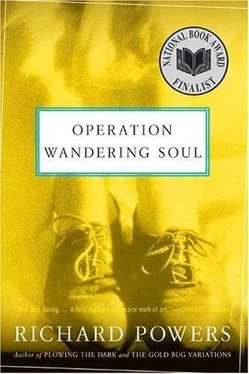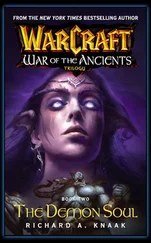Richard Powers - Operation Wandering Soul
Здесь есть возможность читать онлайн «Richard Powers - Operation Wandering Soul» весь текст электронной книги совершенно бесплатно (целиком полную версию без сокращений). В некоторых случаях можно слушать аудио, скачать через торрент в формате fb2 и присутствует краткое содержание. Год выпуска: 2002, Издательство: Harper Perennial, Жанр: Современная проза, на английском языке. Описание произведения, (предисловие) а так же отзывы посетителей доступны на портале библиотеки ЛибКат.
- Название:Operation Wandering Soul
- Автор:
- Издательство:Harper Perennial
- Жанр:
- Год:2002
- ISBN:нет данных
- Рейтинг книги:5 / 5. Голосов: 1
-
Избранное:Добавить в избранное
- Отзывы:
-
Ваша оценка:
- 100
- 1
- 2
- 3
- 4
- 5
Operation Wandering Soul: краткое содержание, описание и аннотация
Предлагаем к чтению аннотацию, описание, краткое содержание или предисловие (зависит от того, что написал сам автор книги «Operation Wandering Soul»). Если вы не нашли необходимую информацию о книге — напишите в комментариях, мы постараемся отыскать её.
Operation Wandering Soul — читать онлайн бесплатно полную книгу (весь текст) целиком
Ниже представлен текст книги, разбитый по страницам. Система сохранения места последней прочитанной страницы, позволяет с удобством читать онлайн бесплатно книгу «Operation Wandering Soul», без необходимости каждый раз заново искать на чём Вы остановились. Поставьте закладку, и сможете в любой момент перейти на страницу, на которой закончили чтение.
Интервал:
Закладка:
But Kraft already knows what the thing is. It is the necklace angel hanging around the surplice in the sole portrait he possesses of his choirboy father.
"It's a good-luck… a good-luck…"
"Charm?" To wear while he cuts away her parts, so that things might go well with them on their way from her hip socket to the incinerator.
She flashes her eager thanks for the term and copies it industriously into her notebook.
"Where did it come from?"
Once again, dismay at this doctor's New World need to make questions overt. Joy shrugs. It came from the place all good-luck charms come from. She points vaguely at the roof, where the emergency medical dragonflies have just landed.
"It fell out of the sky."
Out of the sky: of course. The place from which all charms fall. The first word, the formula invocation, the once-upon, anomalous and abandoned, comes back to him. Now he can give her the missing bit of her fallen angel, the key. More than your lifetime before you were born, he owes her, his half of the child hostage swap, a boy your age fell out of the same blue.
That was how he always arrived. And left the same way, a year or two later, when his father went on to another part of what was then still called the developing world. They followed Foreign Service's Coriolis, their country's crusaderism with a human face. One day the boy fell from the sky and landed in the City of Angels, capital of the Land of the Free.
His first snatch of Free speech — from an armed, khaki passport-controller in the improvised airport — was more melodious than any song he'd ever heard. He would have asked the officer to chant the phrase again, had he known how. No need; the whole city was pitched in a singing school of spoken tones.
He had lived in cities that had been sacked a dozen times before the City of Angels had built its first wall. Yet this seemed the most ancient place he had ever seen, the least concerned with the passage of time. It was built in a bend of a senile river meandering down to the South China Sea in switchbacks as lazy as the sutures in a baby's skull. The city perched on this floodplain like a water strider, a floating reed mat that had rooted into an island. What roads there were had been canals until a few years before.
Planless, Krung Thep sprawled away from the river, its watery network spreading like ant trails through sugar. The house his father took them to fronted on a vegetated street and backed onto a canal served by water taxis and buses. Like every other building in the city, the house bobbed on shallow piles.
The walled compound of his new home contained the same servants' quarters, outdoor laundry, rain jar full of mosquito larvae, and copse of rotting aromatic fruit trees he had grown up knowing. But it had one distinctly local touch. Where the shard-tipped wall adjoined the canal, under a tree of wax-pink, edible Liberty Bells sat a tiny house. Doll-sized, its piers supported a triple-tiered, sharply gabled roof in orange and green ceramic. Flame finials shot out from each apex, gracing the encrusted eaves.
Ricky asked the cook, his confidant, about this tiny domicile. In a patois that became his bootstrap into Free, Som told him it housed all the essences that had been displaced when the big house was built. The boy liked to leave jasmine and burning joss sticks by the diminutive front door, an act between veneration and apology.
The floating city consisted of countless life-size, real-world spirit houses. Banks, arcades, bars, Turkish baths, whorehouses, markets, polo clubs, slums, schools, embassies, and dark mazes of hovel stalls all proliferated unzoned. Yet there was only one decisive industry in the Free capital: propitiation.
The city existed to build monasteries. The bulk of Free will had been channeled into them. There was one just up the street from the compound, and one a hundred meters down the canal. One stood across from Ricky's international school. An enormous temple complex, a walled city within the city, occupied the bow-bend of the river, the kernel of the old town. Most of the three hundred monasteries, from sprawling communities to single sheds, were classical in style: bell-shaped stupas flanked colonnaded halls with terraced roofs flamed in finials and topped with tapering spires.
The city was on a centuries-long project to convert itself into an immense way house for the spirit world's indigent. Even those desperately poor without drinking water — two million Angel inhabitants lived and died by milliliters — contributed to building. A week's income went to replace a roof tile, signed on the underside before being supped into position. Free heaven, the boy learned, was not a place but release from place, an escape of the turns of the Wheel. A celestial New York, a mendicant Tokyo, an incorporeal Paris, the City of Angels constructed itself in an architecture beyond desire.
The neighborhoods forgoing enlightenment ran in two-story, poured concrete shanties. Shops at ground level were topped by a combination office, warehouse, and family living cube. In these shops the boy learned to bargain. Even a hundred grams of candy had a concealed price that had to be discovered jointly by vendor and customer. Ricky could fake shock at suggested retail, feign indifference over an item he burned for more than all the pocket change in existence. He perfected the art of walking away, then turning at the right, world-weary moment to suggest, in the most resigned tonal speech, a compromise. Shopkeepers baited him with inflated prices, just to see this miserable excuse for an albino roll out his repertoire.
His vocabulary grew rapidly. His ear, at thirteen, was still liquid. There were sounds in the massive alphabet that his parents could not distinguish, let alone produce: an intermediate between b and p; a vicious initial ng that came from a place in the back of the throat missing in white adults. Impaired, his parents employed Ricky to negotiate with tradesmen or placate Som's anxieties over the invasion of the evening's pallo by winged hordes.
A barrier more intractable than pronunciation prevented his parents from ever becoming Free speakers. In Free, a word's meaning hinged on a proper deployment of the five tones. His mother, an amateur musician, could hear something wonderful happening in every spoken syllable. But neither she nor Kraft Sr. could hear, let alone enunciate, the difference between "color" and "four."
The boy, on the other hand, knew the tone of a word before he'd even learned it. He knew the tone was the word. Thus he could make, from what sounded to his parents like five equivalent syllables, the brilliant if rhetorical question, "New silk doesn't burn, does it?"
He studied Free at the International Institute of the City of Angels. The school housed the city's foreign children, a monastery complex without the finials. The school mascot — racist joke on all farangs, whatever their melanin — was Hanuman, the white monkey general from the national poetic epic.
Ricky soon studied Free with the oldest, even learning the elaborate script. He learned to name two dozen banana varieties from dealings with the canal boats. Som taught him how to sing in a seven-pitch musical scale, twisting each note with the word's inflection. But his real language lab took place in the streets, where he quickly learned everything from "corner kick" to "bugger your mother."
Time thrived not in the verb but in context. Yesterday it rains. This afternoon, it rains. Cool centuries from now, when you at long last graduate from bodily history, it rains. The subtle colorations of tense-less time seeped deeper into him. He slowly understood it, or, in the Free for "understand," it heart-entered him.
It heart-entered him until he felt nowhere but where he was, a white ghost in an inland port on the Gulf of Free, in a street overrun by pedicabs and tone-haggling merchants, laced with jasmine and temple bells, bells rung by pilgrims' staves in the same intervals as the seven-pitch songs Som taught him. He sang the songs at thirteen, hearing in advance what the pitches would sound like at second hand, when the one place on earth he ever belonged to was reduced to this exotic travelogue, dim cartoon.
Читать дальшеИнтервал:
Закладка:
Похожие книги на «Operation Wandering Soul»
Представляем Вашему вниманию похожие книги на «Operation Wandering Soul» списком для выбора. Мы отобрали схожую по названию и смыслу литературу в надежде предоставить читателям больше вариантов отыскать новые, интересные, ещё непрочитанные произведения.
Обсуждение, отзывы о книге «Operation Wandering Soul» и просто собственные мнения читателей. Оставьте ваши комментарии, напишите, что Вы думаете о произведении, его смысле или главных героях. Укажите что конкретно понравилось, а что нет, и почему Вы так считаете.












